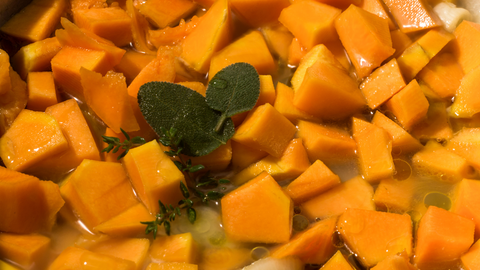If you’ve ever had digestive issues, you know gut health is important for feeling your best. The same applies to our dogs. Unfortunately, digestive issues like IBD (inflammatory bowel disease) are less defined and harder to diagnose for them. One UK study found that throughout 93 clinics in central and south-eastern England, gastrointestinal disease was one of the most prevalent disorders among dogs.
IBD in dogs typically manifests as weight loss, frequent vomiting, and diarrhoea. Pups with IBD can also suffer from severe cramping and pain because of their illness. Every pet parent has thought at some point that life would be so much simpler if only our dogs could tell us exactly what they need - especially when they’re sick. But if your pup is diagnosed with IBD, don’t panic. Now that you know the issue, you can transition your pet to an IBD-friendly, natural, plant-based diet.

Can IBD in Dogs be Managed with a Vegan Diet?
IBD is quite literally what the name suggests; it’s the inflammation of the gastrointestinal tract and is typically caused by either a parasitic or bacterial infection (think Salmonella or E. coli) or a reaction to the processed animal protein found in commercial dog foods. High meat content dog food has become increasingly popular over the years, and unfortunately, the more popular it’s become, the more digestive issues have become common among dogs.
What does this tell us?
IBD in dogs mainly comes down to their diet. While there isn’t a cure for this disease, doctors would typically recommend a course of treatment that includes medication and a prescription diet. This might sound simple, but the issue with hydrolysed protein dog food and prescription diets for IBD in dogs is that there’s actually little to no difference between these and the commercial dog foods you previously fed your pet. Medications have their own problems and side effects so when they do not work, owners are left with upsetting choices to make; including euthanasia.
Research has found that the only way to manage your dog’s IBD is with a healthy, easily digestible, plant-based diet.
What to Feed a Dog With IBD

We all love our dogs and want to give them the best life possible, which includes giving them the best food possible. IBD can be really painful for some pups, and tackling the nutritional needs of a dog suffering from IBD isn’t easy. But by educating yourself on gut-healthy foods for your furry friend, you’ll be on the right track to managing your dog’s IBD.
We know that the recommended diet to treat IBD in dogs is natural and vegan, but let’s get a little more specific.
Dogs with IBD need a diet that’s hypoallergenic, plant-based, high-fibre, and doesn’t contain any of the top allergens in dogs: beef, dairy, wheat, lamb, egg, chicken, soya, pork, corn, rabbit, and fish (in that order!). When removing animal-based proteins from your pet’s diet, you must ensure they receive adequate protein intake with their new vegan diet. A protein level of about 25% can cause an adverse reaction in your pet, so try maintaining a protein intake level between 22-25%. Sometimes this amount may be recommended to be even lower.
When treating IBD in dogs, their diet should ideally contain high-quality, nutrient-rich, easily digestible ingredients. The following are some additional foods that are safe to feed your dog when they’re suffering temporarily from the effects of this disease:
- Cooked butternut squash or pumpkins are excellent for regulating bowel movements and improving stool consistency in dogs. They’re also a highly soluble source of fibre, which is perfect for dogs with IBD.
- Cooked sweet potatoes with no skin are high in fibre and also contain essential vitamins and minerals that your dog needs. Including cooked and mashed sweet potatoes in your dog’s meals is an excellent fibre supplement.
- Quinoa is high in fibre, packed with protein, provides a good balance of fluid and electrolytes, and is a great alternative to gluten and wheat in a dog's diet.
- Oats are perfect for dogs who need help with digestion and weight management. They are rich in minerals, nutrients, and antioxidants and are also an excellent source of protein and a highly soluble fibre, which helps with digestive issues.
- Psyllium husks are a natural laxative that promotes digestive regularity in dogs and is really good for all-around tummy health. At Fleetful, we sell Umameo Ginger Treat Kits that contain psyllium husks for digestive health.
- Carrots are another good source of soluble fibre for dogs. They help regulate their bowel movements and promote the growth of healthy bacteria in their gut. They’re also a great source of antioxidants, which support the immune system.

Tips for Feeding Dogs with IBD
If your dog has severe sickness or diarrhoea, they may not be able to eat a solid meal. You can try feeding them a warm vegetable soup made with celery, green beans, carrots, and parsley. This will provide your pet with the nutrients they need while easing the stress on their gut to process a heavy meal.
When feeding a dog with IBD, you must also ensure you only feed your pet small amounts regularly. Imagine having stomach issues and then sitting down to a large meal. By feeding your pet smaller amounts of food more often, you alleviate the stress on their digestive tract. Feeding your dog the correct type of food is crucial, and the frequency and portion sizes should also be carefully monitored.
Additionally, encourage your pet to eat more slowly and deliberately. Some pups get so excited at mealtime that they can’t help but scoff down their meals as quickly as possible. Using slow-feeder dog bowls promotes healthier eating habits in your pet and will allow your dog to digest the food better.
Benefits of a Vegan Diet to Manage IBD in Dogs
Though IBD can be difficult for your pet, there are several health benefits which support that maintaining a healthy, balanced diet is the best choice to manage your pet’s digestive issues. The following are the top five benefits of switching your dog to a natural, plant-based diet:
1. Provides Prebiotics
Prebiotic fibres are non-digestible carbohydrates found in some vegetables and fruits that serve as a food source for healthy bacteria in the gut. They promote a healthy gut microbiome, improve digestion, and support overall health in dogs with IBD. Coupled with a high-fibre diet, prebiotics are a natural and effective way to regulate your dog’s digestion. Oats, pumpkin, beans, and sweet potatoes are excellent sources of prebiotics.
2. Avoids Food Allergens
So many pet owners struggle with getting their dog’s food allergies under control, but eliminating one or two of the potential allergens isn’t enough, and a complete change in diet is the best solution. People often think of dogs as natural carnivores, but as we’ve mentioned before, the most common food allergens in dogs come from animal proteins, with beef being the number one reported food allergen among dogs. IBD is highly reactive to animal proteins, but vegan dog food is hypoallergenic and naturally anti-inflammatory. With a healthy, balanced, plant-based diet, your dog will no longer be exposed to harmful food allergens.
3. Reduce Chemicals in Your Pet’s Diet
Do you ever really know what goes into commercial dog food? Organic plant-based fresh food is the best choice to treat IBD in dogs because it has limited chemicals that irritate your dog's digestive system. A vegan diet is free from antibiotics and hormones that are often found in dog food and can be incredibly harmful to your dog’s health.
If you’re interested in switching your dog to an organic, fresh food diet, the Fleetful small starter kit is great for dogs with allergies and sensitive digestion who want to try vegan food for the first time.
4. Provides Probiotics
Several vegan foods will provide your furry friend with healthy probiotics that help support digestion and boost the immune system. Probiotics do an excellent job of alleviating diarrhoea, aiding with food allergies, and helping absorb vitamins and minerals. Research has also shown that probiotics help improve the diversity of healthy bacteria in the gut and are beneficial in treating gastric issues like IBD in dogs.
5. Weight Management
A lack of appetite, diarrhoea, and vomiting are common among animals who suffer from IBD, which can cause significant weight loss. However, through a healthy plant-based diet, dogs who suffer from IBD will regain their appetite and improve their digestive function. Plus, vegan diets aren’t high in saturated fats, provide nutritious options, and have fewer calories than meat-based dishes. So, you don’t have to worry about your pet becoming obese or struggling to maintain a healthy weight.
Final Thoughts
Digestive issues are painful and challenging for anyone, humans and dogs alike. But regardless of your species, adopting a gut-friendly diet and being more intentional about the food is important for your overall health. Just like you, your dog deserves a diet that has real food and real health benefits.


3 comments
My Boston terrier (11yrs) has just been diagnosed with IBD, she has never been a picky eater until now. We tried her on RC Anallergenic, which was good for a week, but then she decided she didn’t like it, we switched to RC Hypoallergenic which she now picks at, she has lost so much weight in such a short amount of time. Your blog was very informative and has given me some more idea on what to feed her. I will definitely be transitioning her over to a more plant-based diet. Will see how this goes over the next few weeks. Thank you ☺️
Beverley, have you tried a vegan diet such as fleetful and/or ‘give a dog a bean’? There is nothing quality about a meat diet for dogs. Dogs thrive on dog food which uses plant based protein.
Hello ,my jaxon who is a staffy as just been diagnosed with IBD . Could you please recommend a food suitable ,through out is short life of 3 yrs he as had alot of episodes of sickness . He was only fed on quality food which was chicken or turkey varieties due to sensitive stomach, which I think one of these proteins have bought on is IBD .
Thickening of small intestine was the finding after he spent day in the vets having allsorts of tests and biopsy.
I don’t want him on vet prescription as they are full of crap . Can you recommend me afoot that will allow him to lead normal life .